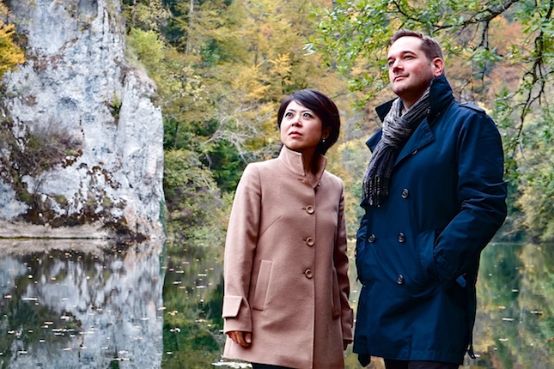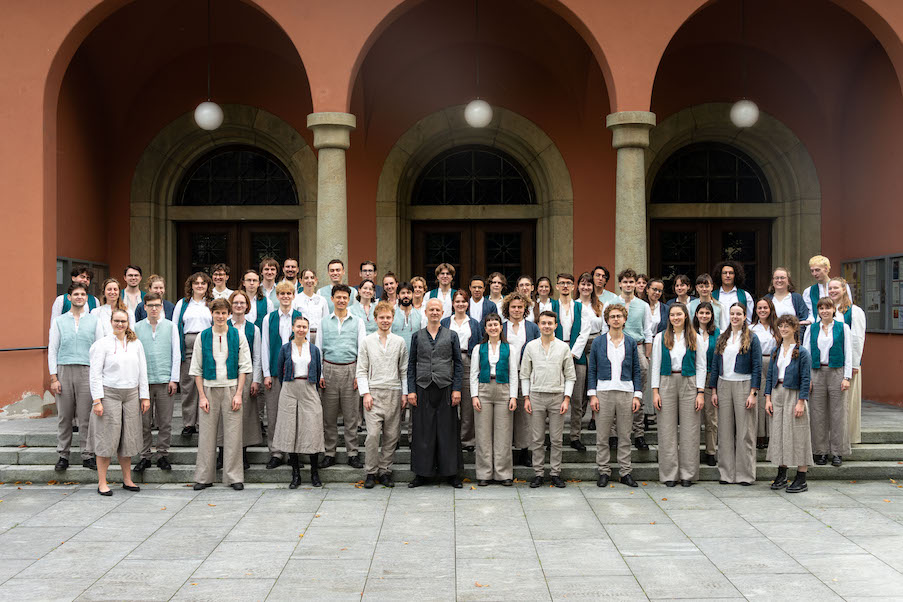Pearls of folk music arranged
An hour of pleasant travel to different lands, with compositions by Britten, Adorno, Brahms, Dvořák, Ravel, Mamiya, Szymanowski, Grieg and Bartók, performed with delight by tenor Raphaël Favre and pianist Satoko Kato.

Musicians can be sectarian. There is often strong dissension between lovers of "great music" and aficionados of popular music. And yet, many of the world's greatest composers have rejected this schism by taking a close interest in their own roots or those of other peoples. These include Bartók, of course, but also Brahms, Beethoven, Ligeti, Britten, Ravel, Bernstein, Milhaud, Poulenc and many others. Raphaël Favre and Satoko Kato offer us a few pearls, known or unknown, of arranged popular music, and it's a delight to listen to.
Britten has published several volumes of popular tunes from England, France and Ireland. Four songs from Great Britain have been chosen by the performers on this CD. From the outset, they draw us into a world of subtlety, thanks to the finesse of their phrasing and the clarity of their diction.
The following pieces are astonishing: songs that all French speakers know (an the moonlight, the pretty drum, ah! ça ira!, the Pont d'Avignon, make dodo, next to my blonde, I have good tobacco). Less well known is the fact that these songs are harmonized by the philosopher Adorno. A pillar of the Frankfurt School and theorist of new music, he was above all, in his compositions, a disciple of the Vienna School in general and Alban Berg in particular. However, Adorno uses a classical harmonic language to dress up these simple little melodies. A very welcome discovery, followed by three Lieder by Brahms. Both performers excel here, offering a magnificent palette of colors and emphasizing the meaning of the text. Raphaël Favre's diction is absolutely perfect. The clarity of vowels, the presence of consonants, no word escapes the ear. The sound projection is exemplary, supported by an efficient breath technique. Nothing is pushed, everything is mastered, a true joy.
The duet brings out all the nostalgia of a Dvořák song with a line supported by beautiful legato. As with Britten's arrangements, Ravel's folk songs are creations in their own right. While the composer keeps the original melody intact, the piano accompaniment allows Ravel to display all his art of color. Satoko Kato's piano is sometimes incisive, sometimes velvety, forming a totally fused accompaniment to the voice. French songs (in Limousin dialect), Italian, Spanish and Hebrew songs (in Yiddish) are all jewels to be found on this recording.
We presume it was the pianist who suggested we discover a charming Japanese melody subtly harmonized by Michio Mamiya. In his last creative period, Karol Szymanowski was particularly interested in the folklore of his native Poland. The performers offer us 3 melody-joys that introduce us to this little-known side of the composer.
Grieg's political contribution to Norwegian independence is well known. Satoko Kato reveals the extent to which this wonderful composer was influenced by his country. Two pieces for piano that we are surprised not to hear more often in recital programs that distill the same hits over and over again. We mentioned Bartók in the preamble to this article. It is with this composer that we conclude this beautiful journey. For four melodies, the performers take us on a journey through a mixture of nostalgia and good-natured humor.
An hour of music, an hour of pleasant travel to different lands and in good company, while staying at home and, consequently, without CO2 problems!
Folksong Arrangements for Voice & Piano (Britten, Adorno, Brahms, Dvořák, Ravel, Mamiya, Szymanowski, Grieg, Bartók). Raphaël Favre, Tenor; Satoko Kato, Piano. Saru international music SARU 2019002








